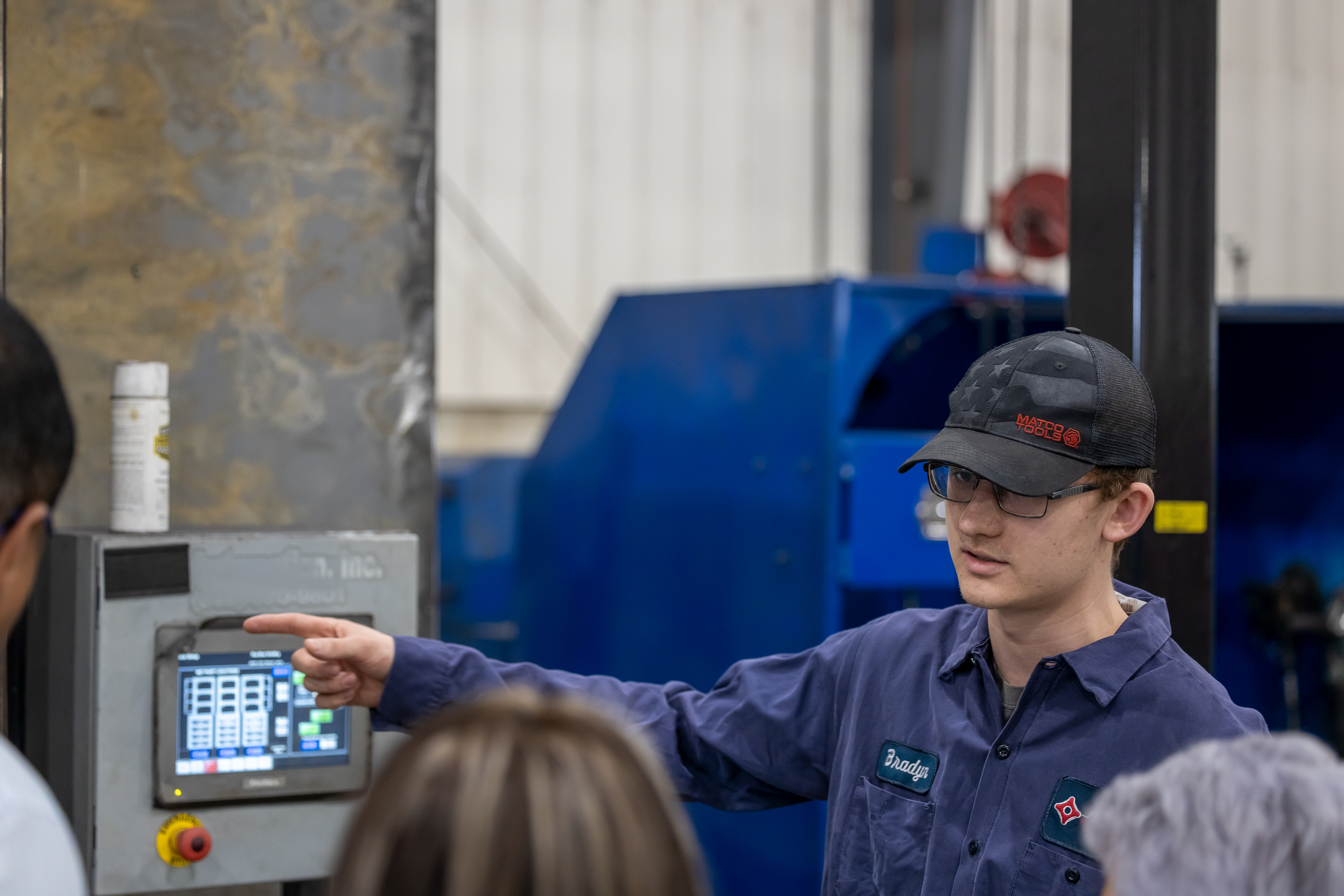Jomar Machining & Fabricating Implements Robotic Welding for Lights Out Manufacturing
Jomar Machining & Fabricating
Case Study
Key Stats
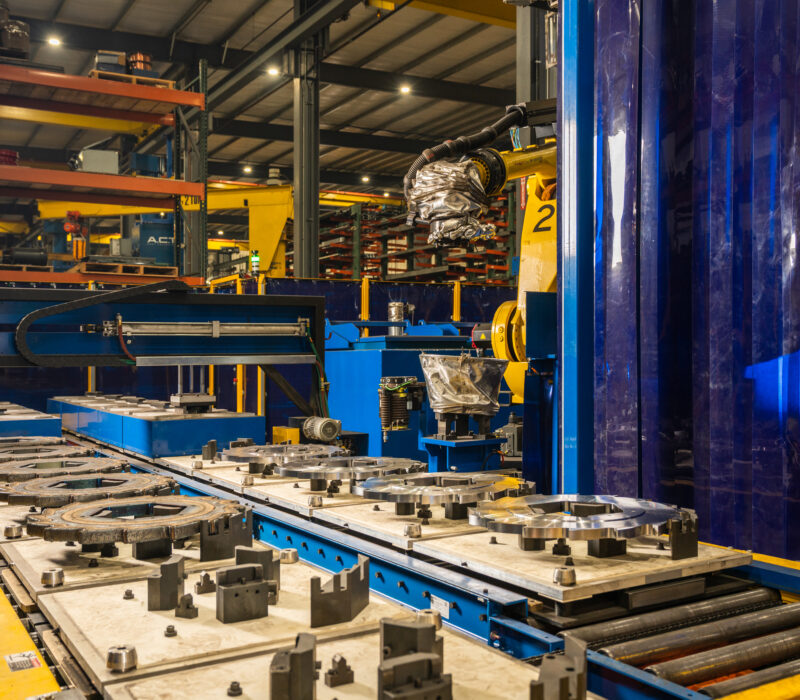
Company History
3 brothers in Elkhart County team up to launch a family-founded manufacturing enterprise.
“Jomar” is a name that invites inquiries, and Lamar Schlabach, General Manager of Jomar Machining, is happy to share the story. He and his brothers started the northern Indiana machining and fabrication company in 1991 and created the name to combine the first names of the three: “J” for Jose, “O” for Omar and “MAR” for Lamar. The company purchased 20 acres and built the business’s first home—a 36’ x 65’ wooden structure to house the job shop that built anything from farm gates to wash line posts. The growth that followed was rapid, and the first expansion followed in 1993. By 1996, a second expansion was added, and the plant is now 24,000 square feet.
Along the way, Jomar established a relationship with Entech, a company producing micronized rubber and crumb rubber powder. That affiliation grew to the benefit of both businesses and, in 2007, Jomar began building the industrial tire shredders that were the core of Entech’s business. Today, Jomar fabricates equipment for tire recycling and shredding operations, capable of recycling thousands of tires annually.
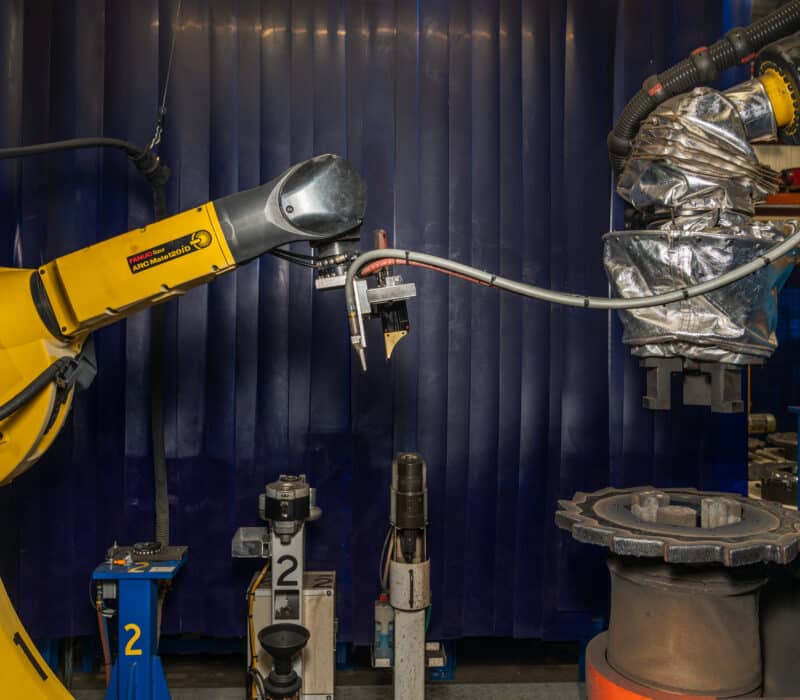
The Project
Jomar implements a dual-robotic welding cell for lights out manufacturing.
Tire shredders are high maintenance. The heavy work is handled by large cutters inside the machine that require frequent rebuilding and replacing, and when Jomar began working on shredders, the task was performed manually with a toll on human welders. The company added basic robotics, but as the volume of work grew, it became clear that a more advanced technology was required to meet the demand from its tire shredding customers across the U.S. and Canada. Finding more employees to increase the company’s existing workforce and adding a second shift wasn’t a practical solution. “It’s pretty hard on a person to do that type of work all day long,” Lamar explained. “The welder has more than 30 pounds of wire and the blade is 550 degrees. Plus, the individual needs that deep welding knowledge and background, and then be willing to spend 8 hours a day actually doing it.”
It made sense to move beyond the boundaries of its existing welding system with a much more sophisticated robotic system that could operate “lights out” (around the clock and on weekends). Jomar focused their grant application on a system that leverages two robots at once—one holds the part and the other welds it. “We aren’t eliminating the welder,” Lamar said. “We’re just taking off the that last piece.”
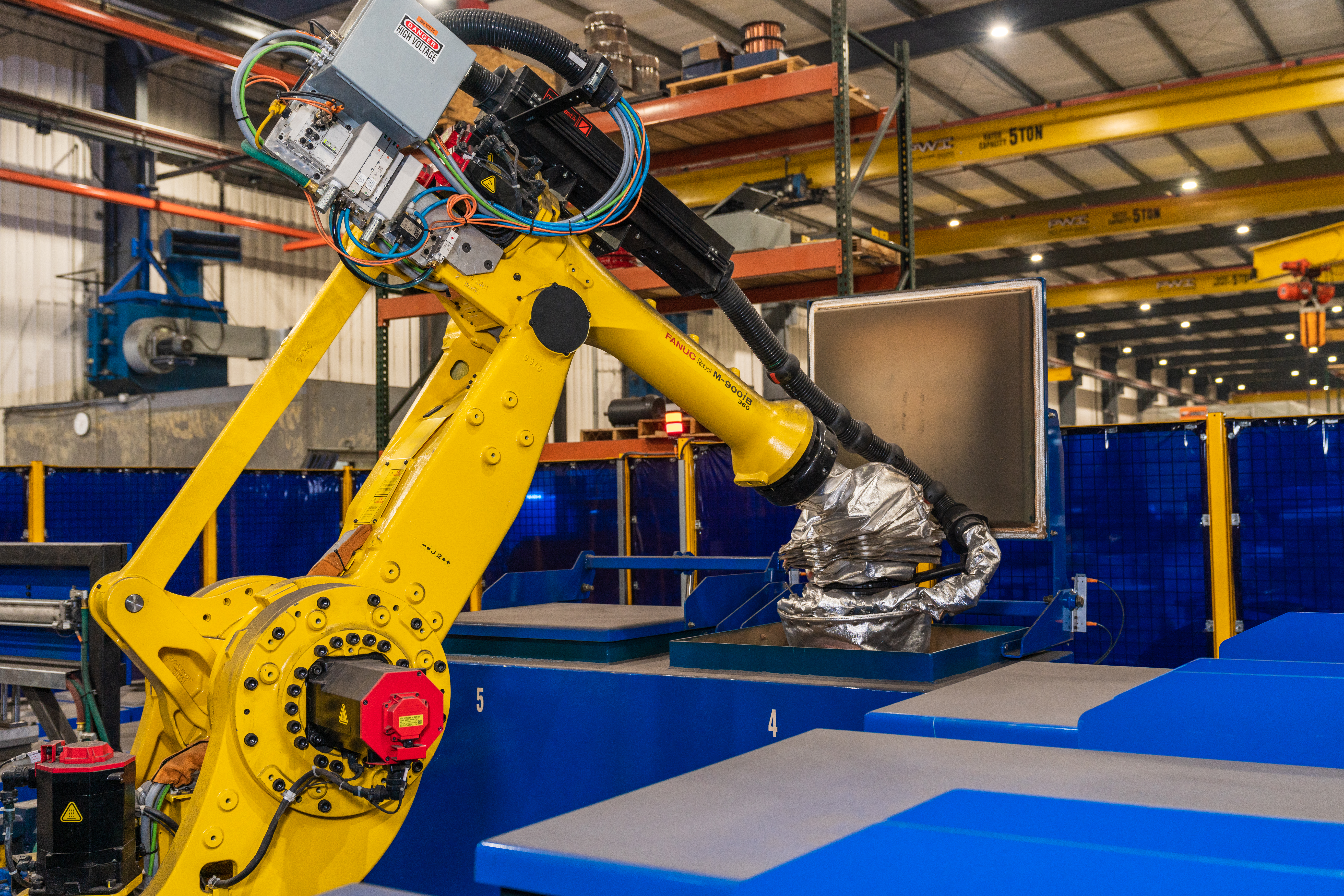
In fact, Jomar launched a Robotic Technician U.S. Department of Labor Registered Apprenticeship program in June 2021, enrolling 3 incumbent employees into the program. This particular program, a part of the Labs for Industry Futures & Transformation (LIFT) Network regional initiative, is comprised of local economic development and workforce ecosystem partners and pairs apprentices with on-the-job mentors and classroom training ranging from courses in mechanical engineering principles, industrial machine programming and more. Purdue Polytechnic Institute delivers this training program for Jomar.
Manufacturing Readiness Grants (MRG) provided by the Indiana Economic Development Corporation (IEDC) and administered by Conexus Indiana are available to Indiana manufacturers willing to make capital investments to integrate smart technologies and processes that improve capacity. Adoption of their first advanced robotic welding system helped Jomar Machining balance its need for increased production in a tight labor market with the help of its successful application for an MRG.
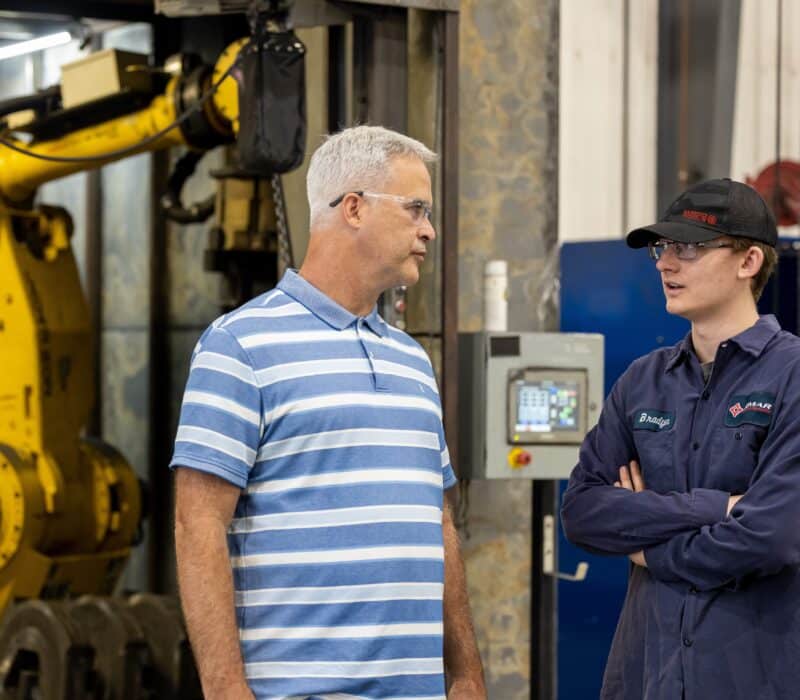
Key Learnings
Developing digital skills in your workforce will help your company succeed in the fourth industrial revolution.
Lamar believes the employees see technology adoption as positive, especially when they learn and work with the robotics. “They’re excited,” Lamar said. “It’s an opportunity to work with new technology and earn more.” The robotic technology demands new skills, and Jomar is helping its workforce learn and develop those skills to succeed in its increasingly tech-driven environment.
“We’ve always believed the best place to work is a nice building with good lighting and clean air, and that’s the environment we create for our workforce,” Lamar said. “Plus, we can pay more when we have one person running as many as three robots because we’re achieving more production.”
Leverage advanced technology to develop and innovate your manufacturing process.
Lamar points out that a blade the company made in the past could be expected to last 1,000 hours. “By leveraging incremental improvements and technology in our manufacturing process… We now get up to 8,000 hours of life out of these blades,” he said. “You can’t just innovate the product you’re making. You also have to innovate the production process for manufacturing it. Technology is important for both of those things.”
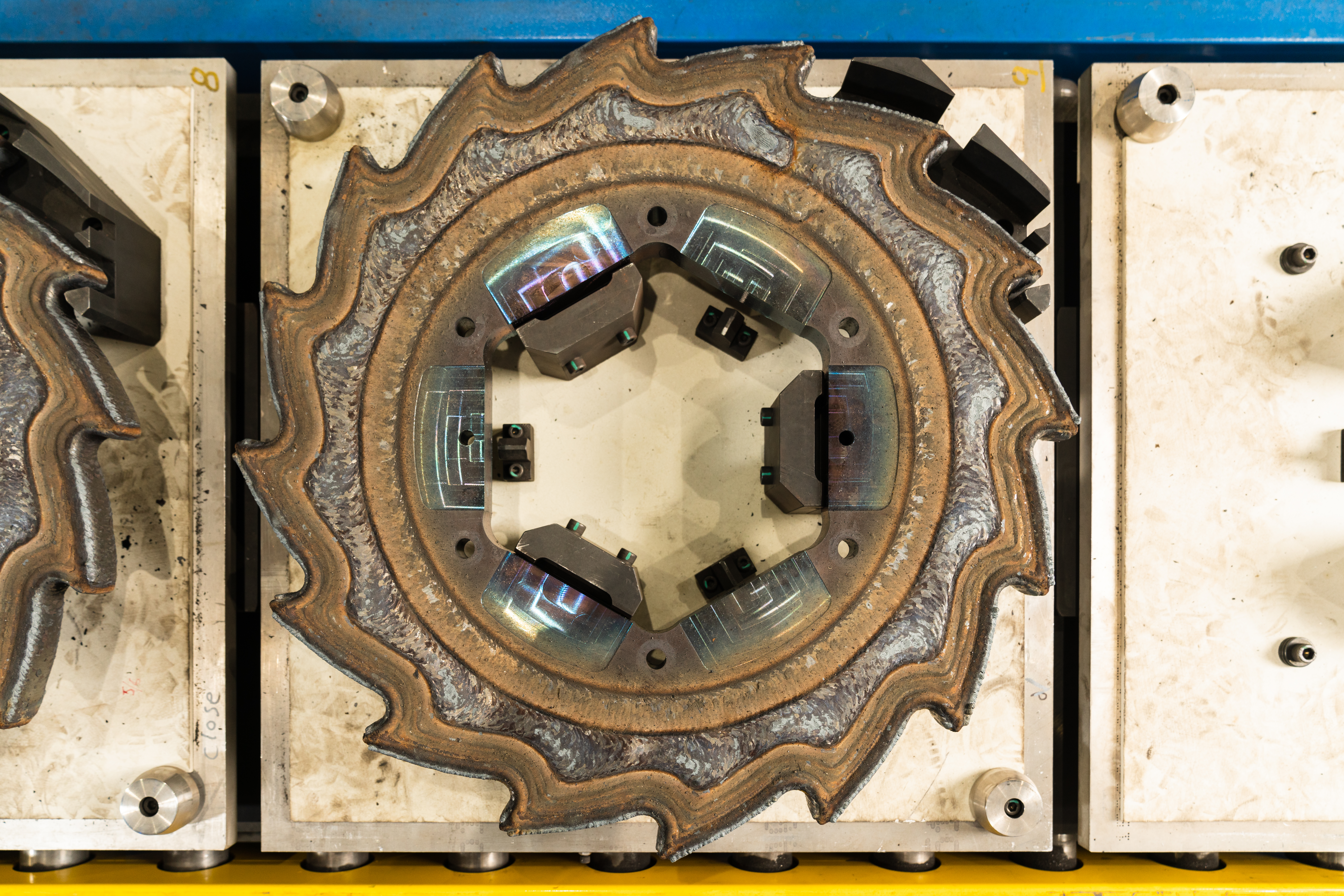
Just months into the project, Jomar is already looking at another robotic welding cell and more automation to grow its services. “We’ve done some studies on predicted volumes, and it’s actually higher than we anticipated. We’re already looking into another robot cell for the same application,” Lamar said.
In closing, Lamar described the company’s process on deciding to move forward with the technology adoption project: “The leading factor for the project was obviously business growth – meeting our customer demands for more blades. We had to decide on whether to add another manually loaded robot or go with a ‘lights out’ manufacturing approach… We chose to go with the lights out option with the help of the MRG program.”
“The leading factor for the project was obviously business growth… We had to decide on whether to add another manually loaded robot or go with a ‘lights out’ manufacturing approach… We chose to go with the lights out option with the help of the MRG program.”
Lamar Schlabach
General Manager at Jomar Machining & Fabricating
